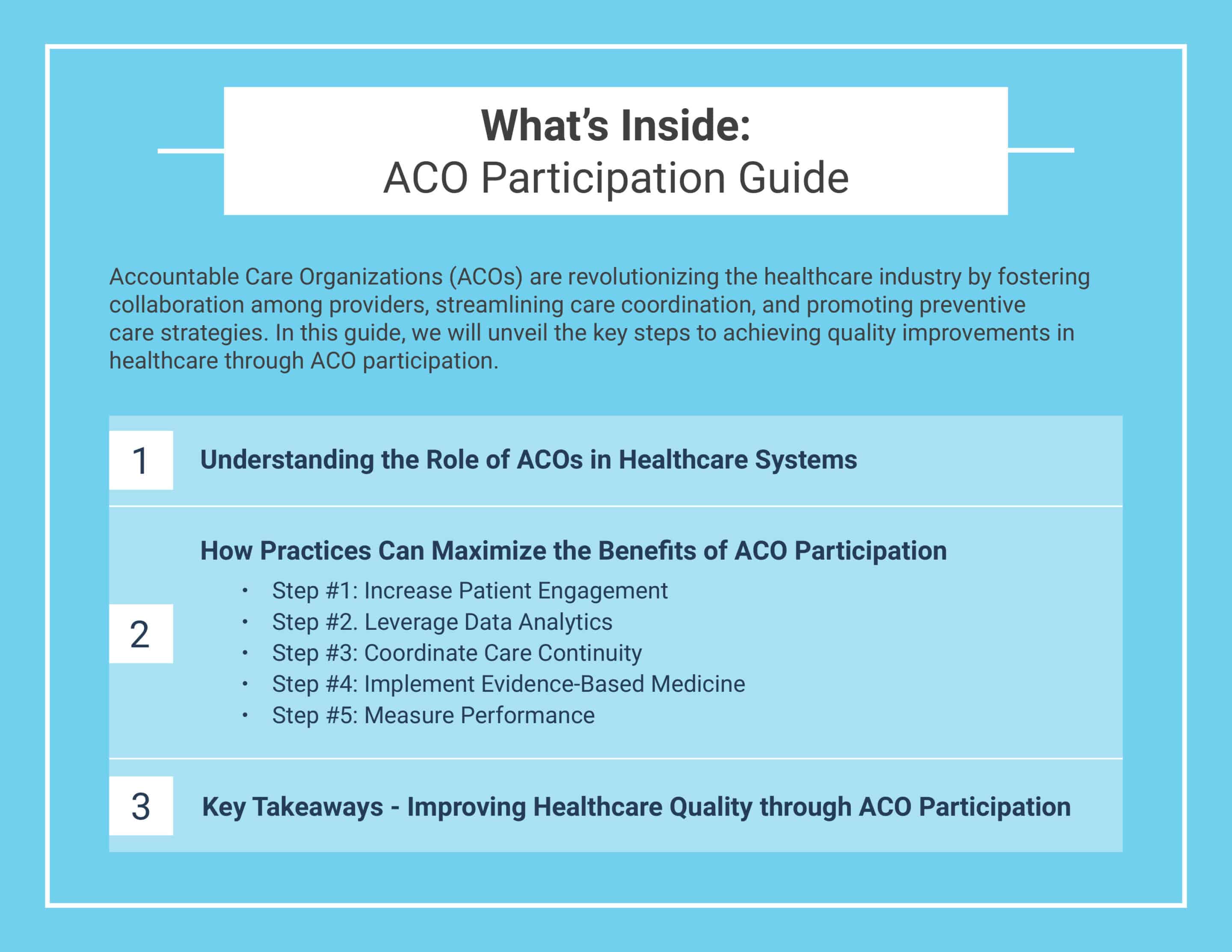
Unlock Healthcare Excellence with Our ACO Quality Improvement in Healthcare Guide
Gain insights and refine strategies to transform the patient experience in your health system. Our ACO Quality Improvement in Healthcare Guide offers actionable guidance on informed decision-making within Accountable Care Organizations (ACOs).
Transform the Patient Experience
Patients who are actively involved in their care tend to make better choices, such as scheduling health screenings and pursuing a healthy lifestyle. For this reason, patient engagement is critical to reduce healthcare costs, optimize outcomes, and promote patient satisfaction. Download our guide to learn more about quality improvement (QI) goals for patient engagement.
Leverage Cutting-Edge Data Analytics
Harness the power of healthcare data analytics to enhance quality improvement. For example, run charts provide a visual representation of data trends and patterns over time, enabling professionals to identify areas for improvement and measure the effectiveness of interventions.
Having a quality improvement plan in healthcare is vital to success. Read our guide and find out how analytics can help you make informed clinical decisions, increase cost savings, and enhance patient outcomes.
Ensure Seamless Care Continuity
The success of every ACO depends on effective coordination and communication amongst providers. Lack of continuity contributes to increased patient waiting times and decreased satisfaction. Download our ACO Quality Improvement in Healthcare Guide to learn how to leverage technology to ensure continuity of care.

Download the Guide Today to Revolutionize Your Healthcare Practices
Are you ready to take your practice to the next level? Download our ACO Quality Improvement in Healthcare Guide today to revolutionize your healthcare organization. Get actionable insights on effective patient engagement, data utilization, and provider collaboration, which are essential for successful outcomes. Download our guide now to propel organizational excellence and transform your patients’ experience.
Continue Below To Download
Download Our ACO Characteristics Checklist Today
About Advantage ACO
Unlock revenue opportunities and maximize payer contracts for the care you provide by participating in our Medicare Shared Savings Program (MSSP) ACO. We are a physician-led ACO with a wealth of knowledge and experience in value-based care along with a strong track record of achieving shared savings. Whether you are a private or group practice or an FQHC (Federally Qualified Health Center), we can help your healthcare organization thrive.
No Fees
We charge no membership fees for ACO participation.
No Risk
The Advantage ACO covers all downside risk.
Autonomy
We are fully supportive of provider autonomy.
Proactive
Proactive planning maximizes performance opportunities.
Program Agnostic
Our interventions improve outcomes for all patients.

Why Prioritizing Quality Improvement Efforts in Healthcare Matters
With technological advancements and the move towards value-based care, it is crucial for healthcare providers to have a model for improvement to ensure they can continue to deliver high-quality care.
However, these initiatives cannot be isolated efforts. According to the Institute for Healthcare Improvement, “In healthcare, quality improvement is the combined and unceasing efforts of everyone – healthcare professionals, patients, and organizations – to make meaningful improvements in safety, effectiveness, and patient experience of care.”
In addition, when discussing the Agency for Healthcare Research and Quality (AHRQ), Jon White, M.D., Associate Chief of Staff of Research at the Department of Veterans Affairs Salt Lake City Health Care System, pointed out key elements of quality improvement in healthcare systems:
- Creating research and evidence for best practices
- Cultivating patient safety expertise
- Focusing on the improvement of patient care
By creating a culture that prioritizes quality improvement, you ensure that your organization is providing the best quality care to your patients.
Frequently Asked Questions About Quality Improvement in Healthcare
What is quality improvement in healthcare?
Quality improvement in healthcare refers to a systematic approach that aims to improve the quality of healthcare services provided to patients. The goal is to ensure that patients receive safe, timely, effective, efficient, equitable, and patient-centered healthcare services.
What are the four components of quality improvement?
The four components of quality improvement in healthcare include:
- Establishing a culture of continuous improvement
- Identifying the root causes of problems
- Developing and implementing interventions
- Measuring and analyzing the results of the interventions
These components work together to create a continuous cycle of improvement processes.
What are the common models used in healthcare quality improvement?
There are several models used in healthcare quality improvement, including the Plan-Do-Study-Act (PDSA) cycle, which is a systematic approach used in quality improvement initiatives. However, the PDSA cycle is just one of many quality improvement methodologies used in healthcare. Other commonly used frameworks include:
- Lean Six Sigma
- Total Quality Management (TQM)
- Continuous Quality Improvement (CQI)
- Rapid Cycle Improvement (RCI)
Each model has its unique features, advantages, and disadvantages. The choice of model depends on the healthcare organization’s goals, culture, and available resources.
How is Quality Measurement Integrated with Quality Improvement in Healthcare?
Quality measurement involves data collection and analysis necessary to inform decision-making, monitor progress, and evaluate outcomes. Quality measurement is integrated into quality improvement by using data to identify areas for improvement, measure the effects of interventions, and monitor progress over time.
What Roles are Involved in Healthcare Quality Improvement?
Several roles are involved in healthcare quality improvement, including:
- Executives and senior leadership
- Quality improvement teams and committees
- Clinical staff and frontline workers
- Patient and family members
- Quality improvement consultants
Each role plays a critical part in the success of quality improvement initiatives and patient safety. The involvement of all stakeholders ensures a collaborative effort towards achieving better healthcare outcomes.
